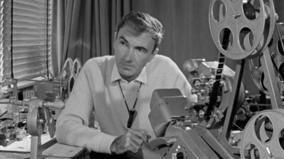New release
Coming
None
The Arthur Lipsett Project: A Dot on the Histomap
2007
52 min
Leaving soon
This full-length documentary introduces us to Arthur Lipsett, a man who defined experimental filmmaking at the NFB in the 1960s. His second film, Very Nice, Very Nice, was nominated for an Academy Award. George Lucas claimed him as an important influence. A decade later, Lipsett's last attempt at filmmaking ended in failure. He chained his Steenbeck and film racks to prevent theft and vanished into paranoia.

Details
This full-length documentary introduces us to Arthur Lipsett, a man who defined experimental filmmaking at the NFB in the 1960s. His second film, Very Nice, Very Nice, was nominated for an Academy Award. George Lucas claimed him as an important influence.
A decade later, Lipsett's last attempt at filmmaking ended in failure. He chained his Steenbeck and film racks to prevent theft and vanished into paranoia.
-
writerEric Gaucher
-
directorEric Gaucher
-
producerAdam Symansky
-
editorJoey CalugayMarie-Christine Sarda
-
additional editingJon Deitcher
-
cameraEric GaucherBert Tougas
-
additional cameraAnthony SeckBruno MartelRyan Young
-
gripBob McKenna
-
animationJonathan Ng
-
original musicSamer Shalabi
-
musicianSamer ShalabiNadia MossAnnie Lawrenz
-
additional musicFrankie Sparo
-
music recordingGeoffrey Mitchell
-
music mixGeoffrey Mitchell
-
archival researchBrett Kashmere
-
narratorEric Gaucher
-
sound editorDon Ayer
-
sound mixLuc Léger
-
graphicsLouise OveryPhilippe RaymondPierre LandryOchelle Greenidge
-
online editorDenis Gathelier
-
digital editing technicianPhyllis LewisOchelle GreenidgePierre Dupont
-
post-production coordinatorLinda PayetteClaude CardinalSteve Hallé
-
production assistantChrista EdsonMelanie KozlanBrett EngelsmanAndrew DentMarc BeauchampKhoba Sysavane
-
production administrative assistantChristine Williams
-
studio administratorMarie Tonto-Donati
-
executive producerSally BochnerRavida Din

















